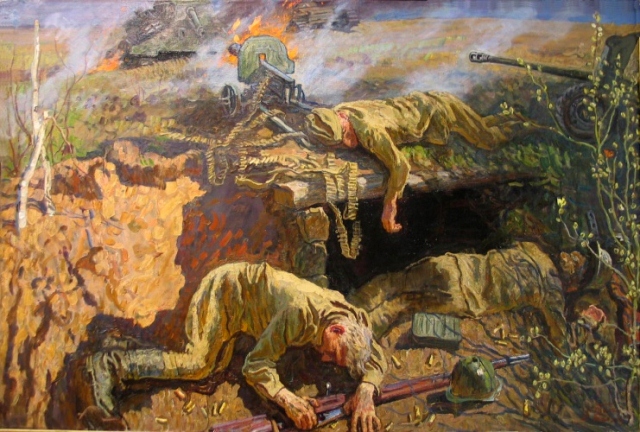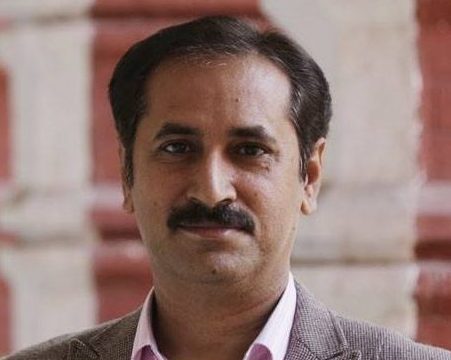
What does a poet know about war?
David Orr
If you were living in England a little over a thousand years ago, you might have listened with great satisfaction as a poet recited lines like these:
We the West-Saxons,
Long as the daylight
Lasted, in companies
Troubled the track of the host that we hated,
Grimly with swords that were sharp from the grindstone,
Fiercely we hack’d at the flyers before us.
This cheerily savage testimony comes from the ancient Anglo-Saxon poem “The Battle of Brunanburh,” and it offers a vision of warfare that has nearly vanished from English-language poetry. As Jon Stallworthy observes in his introduction to “The New Oxford Book of War Poetry,” despite poetry’s martial heritage, “much — and most recent — war poetry has been implicitly, if not explicitly, antiwar.” This is to be expected. The nature and scale of human conflict has changed, Stallworthy notes, making poets vastly more likely to be appalled by war’s consequences than inspired by acts of individual bravery. It’s one thing, after all, to celebrate the courage of 50 men protecting your village from Viking invaders; quite another to be confronted with the smoldering trenches of World War I.
But if war poetry has largely resolved into opposition, this doesn’t simplify it as an undertaking. War poems have a reportorial function: They give us the news about something that has happened. And despite recent suggestions to the contrary, readers generally don’t like their news to be fake; they want it to be (or at least to seem) authentic. Here is where the trouble begins. Because the sense of authenticity — a fragile, volatile creation in even the simplest lyric about birch trees — is pressured from multiple angles in the contemporary war poem. Such a poem must feel authentic to an audience that in general has no personal experience with the direct effects of combat, and that struggles to evaluate the very authenticity it desires.
Yet the poem must also seem to come from an authentic perspective — that is, readers may be dismayed to discover that the poet who wrote so movingly about Qusayr has himself never left the battle-scarred streets of Iowa City. American poets (with rare exceptions like Brian Turner and Kevin Powers) have little involvement with the American military. This is by no means to imply that poets can write effectively about wars only if they’ve worked as soldiers, medics or war correspondents. But it does mean that when writing a war poem, they have to worry about genuineness in a way that they may not when writing about, for instance, sex. No one is concerned if a poet’s own erotic résumé doesn’t include the mild bondage that spices up his 20 lines in Tin House. But a poet who has never been to Syria invokes the shelling of a Syrian village at the risk of losing, if not angering, the reader. As a genre, war poetry is built in the shadow of that ancient workshop bulwark “Write what you know” and its postmodern addition, “or at least can convincingly appear to know.”
So what do contemporary poets know, or seem to know, about war? One of the best answers is: Not much. But knowing what you don’t know can turn out to be more than enough. Jill McDonough’s new book, REAPER (Alice James Books, paper, $15.95), broods over the technology of war — in particular the development of robots, drones and other methods of outsourcing human intelligence and morality to code and circuits. (The first line in her first poem is “I go to the park to see the robots rise,” which is both potentially true — she’s talking about watching the engineers from a nearby robotics company test their inventions — and a clever upending of the pastoral tradition.)
McDonough is no expert, and much of the force of her writing comes from its very secondhandedness. As her chatty lines (“We go see the Rockettes …”) move through the gestures of the modern lyric — only one poem goes over a page, and most use a staccato, colloquial free verse — we get the sense of a writer trying to come to terms with something that is part of her country’s reality but not part of her own. She’s open about this: Multiple poems credit sources like Matt J. Martin’s “Predator: The Remote-Control Air War Over Iraq and Afghanistan: A Pilot’s Story” and John Sifton’s essay “A Brief History of Drones.” Sometimes this can make poems seem like book reports:
Surveillance balloons over
Afghanistan, even cheaper
than drones. Chubby, white,
fishy with fins. In Helmand
they call them milk fish.
In Kandahar they’re frogs
because big eyes.
You may as well just read the New York Times article from which this poem was most likely derived. But when McDonough turns to her own consciousness as it is informed by her research, the results are much more arresting. She visits the Imperial War Museum in Duxford, England, and asks to see the old-fashioned drones:
The wooden-propellered Falconer
is sleek as canoe, red as a wagon. The kind
Marilyn Monroe built: it’s in the pictures
of her as a child bride, a Rosie-the-Riveter
type. A baby is crying, a boy with Tourette’s
swears. All through the museum you
see names, see what names can do.
Strikemaster, Liberator, Vampire.
Hellcat, Avenger. Victor, Hind. Calling
All Everyone! Calling All Everyone!
shouts the boy through the playground’s megaphone.
Calling All Everyone! he’s shouting again,
from the top of the fake control tower.
What does this poem know about Kandahar? Not much, perhaps. But it knows more than enough about violence, which is the ultimate duty of the war lyric.
That said, the war lyric is not the only sort of war poetry, as the Welsh poet Owen Sheers’s verse play PINK MIST (Nan A. Talese/Doubleday, $26.95) capably demonstrates. “Pink Mist” tells the story of three fictional men from Bristol — Arthur, Hads and Taff — who join the British forces in Afghanistan, and it’s based on interviews the author conducted with 30 veterans. Because this poem is also a play, the question of authenticity is slightly altered: We’re concerned less with the author’s experience than his characters’ believability. Fortunately those characters can withstand the scrutiny. They argue, grieve, apologize and alternately console and reproach each other, as the lines flicker from the flattest vernacular (“Just got to griz it out,” “In the past innit?”) to unobtrusive, sometimes elegant rhyme and slant rhyme (“Don’t say it, Arthur. Don’t. / Cos it ain’t right. They made us fit. / That’s what they did. / Fit in, and fit for fighting. / Fighting fit.”). Poetic grandstanding is almost ostentatiously avoided. Sheers wants to wound your heart with plainness.
This can be a problem. At its worst the poem gives in to a sentimentality that is even more annoyingly literary for pretending otherwise. Arthur collects interesting bird eggs one spring before he departs (of course he does), and when he returns home, a flashback to an I.E.D. explosion causes him to flinch, breaking one of them (“The pale blue shards of the heron’s egg / scattered inside the drawer, / like a broken promise”), and this in turn leads to his girlfriend, Gwen, announcing, “That night, when you finally came home, / I felt like that egg in your palm, / crushed to the bone.” How helpfully symbolic this hobby has turned out to be. Good thing he didn’t collect spoons.
But in its more frequent affecting moments, the poem gives us a portrait of men and women in a state of bewildered ruin. Just a few stanzas after the lines above, Gwen reflects on the aftermath of her first sexual encounter with the damaged Arthur upon his return:
“We going out?”
That’s all you said.
Like nothing had happened.
“Yeah,” I replied.
Trying to understand
what it was that had died.
Looking back though,
perhaps you were right.
Cos nothing is what it was.
Nothing —
that’s what you filled me with
that night.
There is a kind of nothingness that haunts war poetry, even the exhortations of the old Anglo-Saxon bards. Not the quiet nothingness of death, though this is a part of it, but the burning, contagious nothingness that we call destruction. Which at times has filled, or emptied, all of us.
____________________
David Orr has been writing the On Poetry column for the Book Review since 2005. His new book, “You, Too, Could Write a Poem,” was published in February this year.
Courtesy: New York Review of Books




